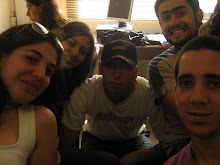Discussion of Logos, Ethos, and Pathos in the ad starred by Nada Bou Farhat for KAFA Organization:
-Logos:
Looking at this billboard, we can see two major logos or signs, one representing "KAFA Organization" and the other representing the "National Alliance for Legalizing the Protection of Domestically Violated Women." These logos weren't just placed for the visual of the ad, but to show that the idea behind this ad is logical and supported by special organizations in Lebanon: supporters and protectors of women from being violated in Lebanon have obviously decided to start a campaign based on facts and real life experiences. And being in the period of elections, organizations have decided to use ads in order to arouse in women their demand for their rights especially in what concerns the elections (As we all know, women in Lebanon are underestimated, especially when it comes to politics, and when people go back to thinking like the old times). So obviously, so far, this ad has presented one of the three Rhetorical Devices of Aristotle, Logos (Logic and reason while constructing the ad).
-Ethos:
Concerning morals and ethics, we can notice how, in this ad, there is an emphasis on the idea that women in Lebanon are still treated just like the old days: underestimated especially when it comes to politics. In fact, women being underestimated is one of the problems Lebanese women face when it comes to the morals and ethics that Lebanese people have always been raised by. Domestic violence is another problem. This is why "KAFA Organization" and the "National Alliance for Legalizing the Protection of Domestically Violated Women" decided to start a campaign that shows that Lebanese women should be getting there rights completely, especially when it comes to politics and elections. So in addition to the presence of logic in this ad, we can also notice how it is dealing with the ethics and the position of women in relation with them in this country.
-Pathos:
And last but not least, we can't deny the presence of pathetic appeal. In what concerns this ad specifically, we can see how it is trying to affect the feelings of women in Lebanon by arousing in them the need to demand their rights, especially after they've always been underestimated and left behind when it came to decision making or handling responsibility. Women, a long time ago, have never been able to express themselves the way they should've because society positioned them inferior to men, and we're talking about social role more than anything else. But luckily, the birth of organizations helped a lot in waking the woman in every Lebanese woman, and here they are today, representing women in this ad and arousing in them the feeling of independence. All this, and in addition to the image of Nada Bou Farhat, the actress that has always been an idol for most Lebanese women, that shows her in a sad and confused mood, just like most females in Lebanon are today when it comes to not getting there rights politically. So eventually, we can now agree that the three Rhetorical Devices of Aristotle are present in this ad, which makes it stronger and more affective when it comes to its target, Lebanese women generally.
Finally, and based on the previous analysis of this ad in relation with Aristotle's Rhetorical devices, we can see how the three devices, Logos, Ethos, and Pathos are complimentary to each other, and how the campaign would fail if any of them were absent.
E.M.
Subscribe to:
Post Comments (Atom)


An intelligent response. Interesting and thought-provoking.
ReplyDelete